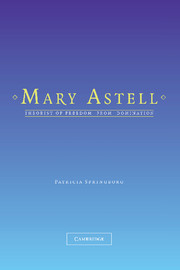Book contents
- Frontmatter
- Contents
- Acknowledgements
- Mary Astell, a Brief Chronology
- Introduction: Astell and Early Modern Feminism
- 1 Mary Astell, Philosopher, Theologian and Polemicist
- 2 Astell, Drake, Education, Epistemology and the Serious Proposal
- 3 Astell on Marriage, Patriarchalism and Contractarianism
- 4 Mary Astell and the Settlement of 1689
- 5 A Fair Way with the Dissenters and Their Patrons
- 6 Astell, Locke and the Highway Man: A Test Case
- 7 Astell, Drake and the Historical Legacy of Freedom
- Appendix: Glossary and Select Biographical Notes
- Notes
- Select Bibliography
- Index
3 - Astell on Marriage, Patriarchalism and Contractarianism
Published online by Cambridge University Press: 07 September 2009
- Frontmatter
- Contents
- Acknowledgements
- Mary Astell, a Brief Chronology
- Introduction: Astell and Early Modern Feminism
- 1 Mary Astell, Philosopher, Theologian and Polemicist
- 2 Astell, Drake, Education, Epistemology and the Serious Proposal
- 3 Astell on Marriage, Patriarchalism and Contractarianism
- 4 Mary Astell and the Settlement of 1689
- 5 A Fair Way with the Dissenters and Their Patrons
- 6 Astell, Locke and the Highway Man: A Test Case
- 7 Astell, Drake and the Historical Legacy of Freedom
- Appendix: Glossary and Select Biographical Notes
- Notes
- Select Bibliography
- Index
Summary
The Marriage Contract–Social Contract Analogue
Debate over the reception of Locke's anonymously published Two Treatises of Government (1690) has never given Astell her due. Her argument, in the first edition of Reflections upon Marriage (1700), that the very men who press for liberty in the public sphere are the first to exempt themselves from constraints on the exercise of their power at home, is an important anticipation of the argument mounted against the social contract theory of ‘Great L–k in his Two Discourses of Government’ by Charles Leslie in 1703. It is an argument that Astell develops in high style in her famous 1706 Preface to Reflections upon Marriage. Not only is her critique more trenchant than that of Leslie, published in the Supplement to his The New Association, Part II of 1703, but it is earlier on two counts, having been introduced not only in the body of the text of Reflections upon Marriage as early as 1700, but also implicit in A Serious Proposal, Part II, as we have seen. Introduction of the argument by Astell as early as 1697 has not been previously noticed. Nor has any account been taken of her bitter pleading in A Fair Way with the Dissenters and Their Patrons of 1704 against Leslie's getting credit for her earlier pamphlet of that year, Moderation Truly Stated, evidence enough, were any needed, that women who had to publish anonymously in her age could be plagiarized at will.
- Type
- Chapter
- Information
- Mary AstellTheorist of Freedom from Domination, pp. 113 - 142Publisher: Cambridge University PressPrint publication year: 2005



